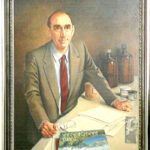By Michael Howell –

Employees and community members gathered outside Glaxo-Smith-Kline Biologicals laboratory on Old Corvallis Road last Tuesday, June 7, to celebrate the 30th anniversary of the lab site founded in 1981 with the formation of Ribi ImmunoChem Research, Inc. by Drs. Edgar Ribi, John Cantrell, Steven Swartzman and Reno Parker.
The foundation of the original company was based on research into immune system stimulating properties of bacterial cell wall components and led to the development of monophosphoryl lipid A (MPL), an adjuvant that improves the durability and specificity of vaccines.
The GSK laboratory in Hamilton is the sole manufacturing site of the MPL adjuvant that is a key component in Cervarix, a human papilloma virus (HPV) vaccine approved in over 100 countries worldwide, and approved in 2009 for use in the United Sates. MPL is also a key ingredient in FENDrix, a hepatitis B vaccine approved for commercial use. MPL is also used in clinical vaccines undergoing trials for treatment of malaria, shingles, lung cancer, melanoma and pipeline vaccines.
Site Director at the Hamilton lab, Michael Covarrubias, served as Master of Ceremonies at the anniversary celebration introducing the various speakers at the event. Keynote speaker, Andrew Witty, Chief Executive Officer of GSK Global, flew in from London, England for the celebration. Dr. Nathalie Garcon, Vice President and head of the Global Adjuvant and Delivery Systems Centre in Wavre, Belgium, also spoke at the gathering as did Dr. Kenneth Von Eschen, Manager of Clinical Development in Hamilton. A video message was delivered from Dr. Moncef Slaoui, Chairman of Research and Development at GSK.

Dr. Eschen gave a thumbnail history of the lab site, started by Dr. Edgar Ribi and compatriots in 1981. The groundbreaking laboratory work that led to the creation of MPL was conducted in an old chicken coop converted into a laboratory. The huge state-of-the-art lab now established on the site surrounds the old original structure and currently houses about 200 employees.
In the late 1990s the Ribi lab was acquired by Corixa before finally being acquired by pharmaceutical giant Glaxo-Smith Kline in 2005.
CEO Andrew Witty called the laboratory a great achievement, adding, “not just the building, but the vibes.” He thanked all GSK employees for their dedication and hard work that is saving lives across the world. If approved for commercial use the company’s malaria vaccine could save even more. Deaths from malaria are estimated to total about 900,000 annually.
Covarrubias said that the lab was looking to hire an additional 30 employees as it ramps up production of MPL for use in the Cervarix vaccine. If the malaria vaccine trials being conducted in Africa are successful even more employees may be added in the near future.
